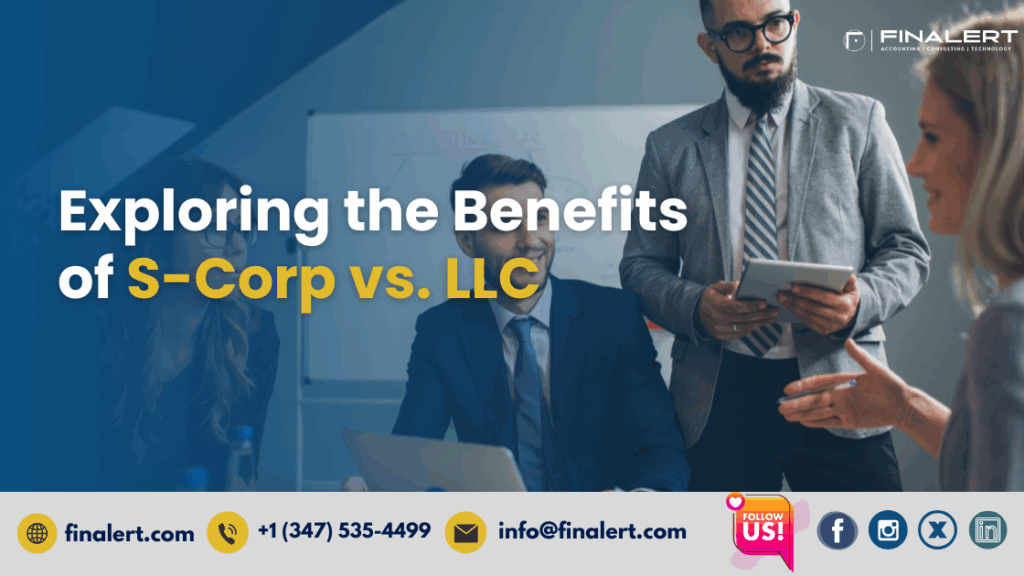
As a business owner, one of the most critical decisions you’ll face is determining the legal structure of your company. The choice between an S-Corporation (S-Corp) and a Limited Liability Company (LLC) significantly impacts your tax obligations, personal liability, and administrative responsibilities. Each structure offers unique benefits tailored to specific business needs, making it essential to understand the differences before committing.
Finalert specializes in helping businesses navigate complex decisions like this, leveraging its expertise in accounting, consulting, and technology services. With the right guidance, you can select the structure that optimizes your tax strategy while supporting long-term growth.
Selecting the appropriate legal entity impacts both day-to-day operations and your company’s long-term trajectory. Key considerations include taxation, ownership flexibility, and state-specific compliance requirements.
LLCs provide a flexible taxation structure. By default, single-member LLCs are taxed as sole proprietorships, while multi-member LLCs are taxed as partnerships. All profits flow through to the owner(s), who report income on their personal tax returns. This avoids the double taxation commonly associated with traditional corporations.
An S-Corp election enables corporations or eligible LLCs to benefit from pass-through taxation while also limiting the tax obligations on shareholder distributions. S-Corp owners typically pay self-employment taxes only on wages received, not on dividends or retained earnings, potentially resulting in significant tax savings.
LLCs allow unlimited members, which can include individuals, corporations, or even foreign entities, providing maximum flexibility. They also require minimal administrative upkeep compared to S-Corps.
S-Corps are limited to 100 shareholders, all of whom must be U.S. citizens or residents. While more restrictive, this structure can benefit closely held businesses that want to streamline operations.
Understanding state-specific compliance requirements and federal tax implications can overwhelm many entrepreneurs. For instance, some states impose additional taxes on LLCs, while others strictly regulate S-Corp distributions. A consultation with Finalert ensures these regulations are seamlessly managed.
While S-Corps may reduce self-employment taxes, mismanagement of distributions could trigger IRS scrutiny. On the other hand, LLC members risk overpaying if they fail to elect advantageous tax treatments like S-Corp status. Businesses need personalized strategies to balance tax efficiency and compliance.

An accountant versed in S-Corp and LLC taxation can provide tailored solutions to optimize your tax strategy. For example, determining the ideal salary-to-distribution ratio for S-Corp owners requires a deep understanding of IRS guidelines.
Utilizing technology solutions such as cloud-based accounting software ensures all tax records and documentation remain compliant and accessible. Finalert’s technology services enable seamless implementation of such systems, helping businesses stay ahead during tax season.
Many LLCs opt to file as S-Corps to capitalize on both operational flexibility and tax savings. This hybrid strategy is especially advantageous for small to medium-sized enterprises.
As automation tools advance, businesses increasingly leverage technology for real-time compliance monitoring and financial reporting. Finalert helps clients integrate these cutting-edge tools into their workflows, ensuring accuracy and scalability.

A small marketing agency approached Finalert to reassess its LLC structure. After an in-depth consultation, the agency elected S-Corp status to minimize self-employment taxes. By adopting optimized salary and distribution practices, the agency reduced tax liabilities by 20%, allowing them to reinvest savings into business expansion.
Choosing between S-Corp and LLC is a pivotal decision that shapes your tax strategy, liability protection, and administrative operations. Understanding the distinctions, benefits, and challenges of each structure is vital to ensuring long-term success.
At Finalert, we guide businesses through this complex process, ensuring you make informed decisions that align with your goals. Contact us at (347) 535-4499 to learn how we can support your business with accounting expertise, strategic consulting, and technology-driven solutions tailored to your need
Similar Articles
No results available
Get in touch with Finalert today for tailored business solutions!
No results available
Ready to thrive? Connect with Finalert today and let’s succeed together in the dynamic global market.
© 2025 Finalert. All rights reserved.
Ready to thrive in the dynamic global market? Finalert LLC offers expert financial services, including accounting, consulting, and technology solutions, tailored to your business needs.
Address
Accounting
Quick Links
Consulting
Industries
© 2025 Finalert LLC. All rights reserved.